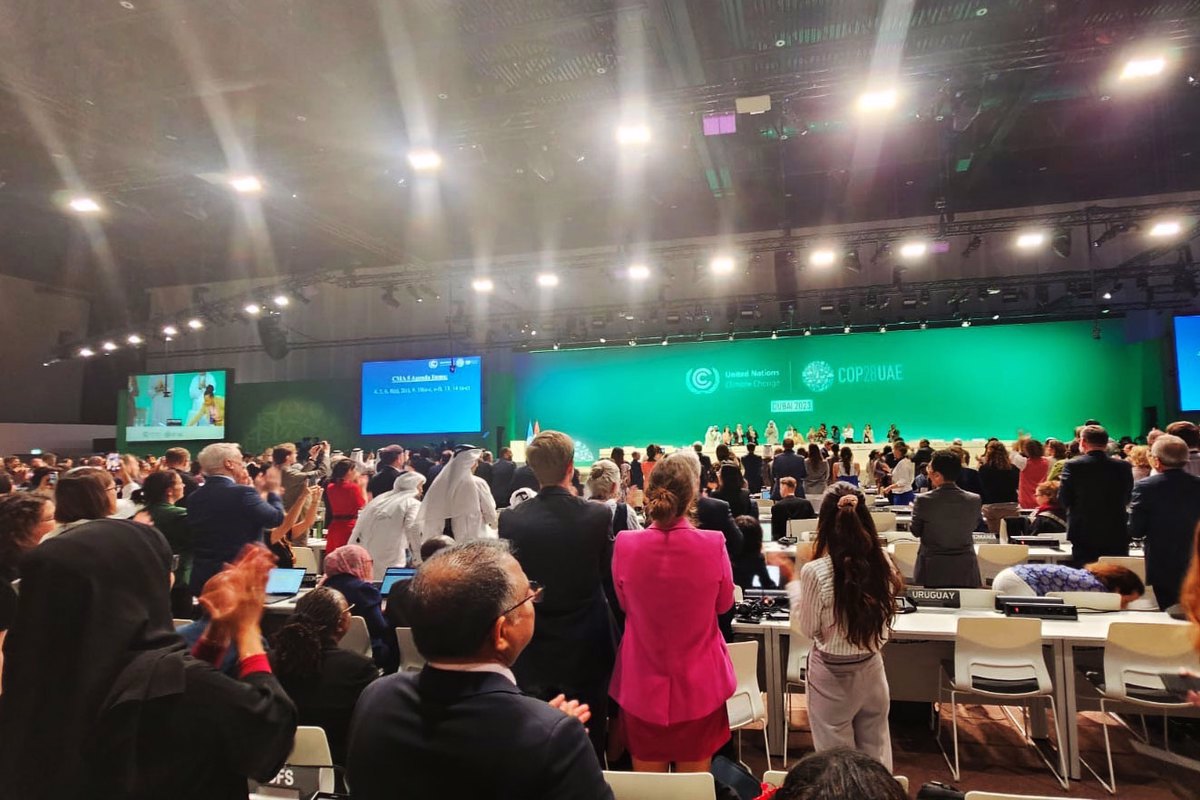COP28 vows to move away from fossil fuels, but is it enough?
Small island states and low-income nations are concerned that the adopted revision on "transitioning away from fossil fuels" at COP28 will not suffice to combat the devastating impact of climate change on their economies.
 PHOTO: 200 nations adopt a historic global stocktake at COP28. Twitter of @grahamstuart
PHOTO: 200 nations adopt a historic global stocktake at COP28. Twitter of @grahamstuart
The COP28 climate summit in Dubai concluded after an overtime effort to move away from fossil fuels. The final draft text was revised to include the phrase "transitioning away from fossil fuels”.
Some critics of the earlier draft lauded the joint effort of 200 nations and cheered the revisions that included more ambitious language to combat global greenhouse gas (GHG) emissions.
The deal “marks the beginning of the post-fossil era”, said Ursula von der Leyen, President of the European Commission.
The countries “adopted historic decision that is strongly guided by 1.5 C limit” at COP28, said German climate envoy, Jennifer Morgan. “There is an unmistakable signal that future is renewables & not fossil fuels. For 1st time, countries made decision to transition away from [fossil fuels] FF, accelerating action in this critical decade.”
UK’s climate minister Graham Stuart called the deal “historic” for “keeping 1.5 alive & specifying fossil fuel use for the first time ever.”
The UAE Consensus Presidency showed pride, stating, “With an unprecedented reference to transitioning away from all fossil fuels, The UAE Consensus is delivering a paradigm shift that has the potential to redefine our economies.”
‘Litany of loopholes’, claim climate-vulnerable nations
It is not all rosy, however, with small island states and least developed nations feeling overlooked amidst the loud applause resonating around the room.
“We did not want to interrupt you, but we are a little confused about what just happened. It seems that you gavelled the decisions, and the small island developing states were not in the room,” Alliance of Small Island States (AOSIS) wrote in an open letter.
AOSIS – a coalition of 39 island nations – complained that the agreement was riddled with a “litany of loopholes” with no call to peak emissions by 2025 and an emphasis on energy systems that was “disappointing”.
In a similar vein, Madeleine Diouf Sarr, chair of the Least Developed Countries (LDC) Group, said there were loopholes in the agreement that could limit actual reductions of emissions.
Although the deal included many “good elements”, the AOSIS letter noted that the necessary “course correction" was not made at COP28. “It does not deliver on a subsidy phaseout, and it does not advance us beyond the status quo,” it said.
“This outcome is not perfect, we expected more. It reflects the very lowest possible ambition that we could accept rather than what we know, according to the best available science, is necessary to urgently address the climate crisis,” Sarr stressed.
Nations pushed to back words with action at COP28
Most observers called the deal a “beginning of the end of the fossil fuel era” and agreed that nations should practice what they preach to keep the 1.5°C goal alive.
“Once upon a time the world put its climate future in the hands of a petrostate and asked it to phase out fossil fuels. This isn’t the perfect fairytale ending we had hoped for, but for the first time we have a global agreement to transition away from all fossil fuels in line with the science,” Maria Mendiluce, chief executive of We Mean Business International, noted.
We Mean Business Coalition led an effort to ensure fossil fuels are phased out at COP28 with support from 131 global companies with nearly $1 trillion/year in combined revenues.
COP28 participants must provide businesses with the "certainty and stability" they seek through their nationally determined contributions (NDCs), according to Mendiluce.
“COP28 needed to signal a hard stop to fossil fuels and their planet-burning pollution. We didn’t turn the page on the fossil fuel era, but this is clearly the beginning of the end,” said Simon Stiell, executive secretary of UNFCCC. “We must get on with the job of putting the Paris Agreement fully to work,” he added.
The deal was “a bare minimum” and “long overdue”, according to former US Vice President and climate advocate Al Gore. “The influence of petrostates is still evident in the half measures and loopholes included in the final agreement.”
Gore argued that policy implementation and mobilisation of funds required to achieve the transition are crucial to ending fossil fuel use.
In addition to adopting the revised text, countries also mobilised the climate-focussed loss and damage fund to financially assist developing and climate-vulnerable countries in achieving their climate goals earlier in the summit. Nevertheless, the fund has attracted only $700 million in pledges so far, a far cry from its initial goal of raising $100 billion/year.
“There is recognition in this text of the trillions of dollars needed to address climate change in our countries. The GST highlights the vast gap between developing country needs and the finance available, as well as underscoring rapidly dwindling fiscal space due to the debt crisis. Yet it fails to deliver a credible response to this challenge,” LDC Group’s Sarr noted.
By Konica Bhatt
Please get in touch with comments or additional info to news@engine.online






